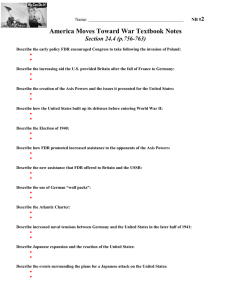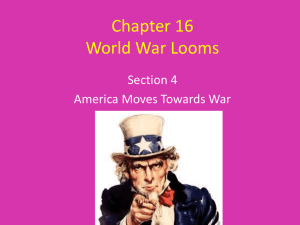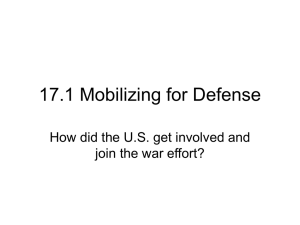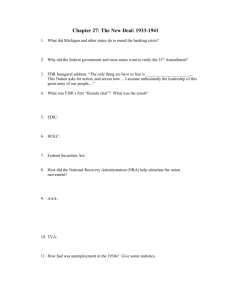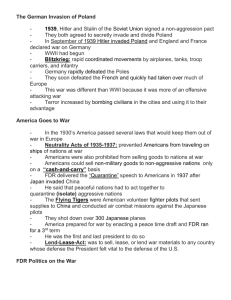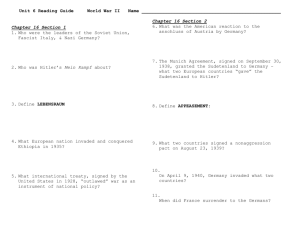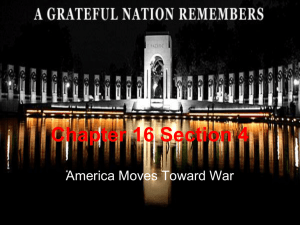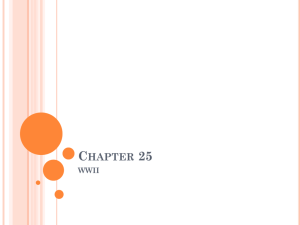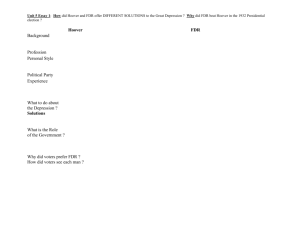America Moves Toward War
advertisement
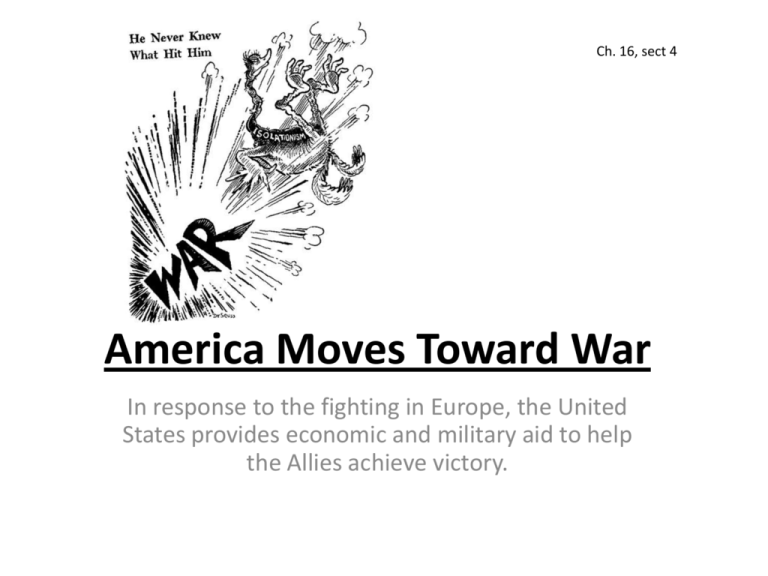
Ch. 16, sect 4 America Moves Toward War In response to the fighting in Europe, the United States provides economic and military aid to help the Allies achieve victory. The United States Musters Its Forces Moving Cautiously Away from Neutrality • Congress to pass “cash-and-carry” provision Sept. 1939, FDR persuades – Argues will help France, Britain defeat Hitler, keep U.S. out of war The Axis Threat • 1940, FDR tries to provide Britain “all aid short of war” • Axis Powers = Germany, Japan, Italy sign Tripartite Pact, mutual defense treaty – Pact aimed at keeping U.S. out of war by forcing fight on two oceans Building U.S. Defenses • Nazi victories in 1940 > increased U.S. defense spending – Congress increases spending because military is weak compared to Axis powers • First peacetime draft enacted — Selective Training and Service Act: – draftees to serve for 1 year in Western Hemisphere only Roosevelt Runs for a Third Term • • • FDR breaks two-term tradition, runs for reelection Republican Wendell Willkie has similar views on war FDR reelected with 55% of votes The Lend-Lease Plan • FDR tells nation if Britain falls, Axis powers free to conquer world – U.S. must become “arsenal of democracy” – By late 1940, Britain has no more cash to buy U.S. arms • 1941 Lend-Lease Act — U.S. to lend or lease supplies for defense. Replaced “cash and carry” Supporting Stalin • 1941, Hitler breaks pact with Stalin, invades Soviet Union • Roosevelt sends lend-lease supplies to Soviet Union FDR Plans for War The Atlantic Charter • FDR’s proposal to extend the term of draftees passes House by 1 vote • FDR, Churchill issue Atlantic Charter — joint declaration of war aims – – Aims: no territorial changes, self-determination, collective security, disarmament, economic cooperation, and freedom of the seas. Charter is basis of “A Declaration of the United Nations” or Allies • Allies — nations that fight Axis powers; 26 nations sign Declaration Japan Attacks the United States Japan’s Ambitions in the Pacific • Hideki Tojo — chief of staff of army that invades China, prime minister • Japan seizes French bases in Indochina; U.S. cuts off trade • Japan needs oil from U.S. or must take Dutch East Indies oil fields Peace Talks are Questioned • 1941 U.S. breaks Japanese codes; learns Japan planning to attack U.S. • Peace talks with Japan last about 1 month • December 6, Japanese envoy instructed to reject all U.S. proposals The Attack on Pearl Harbor • December 7, 1941 Japanese attack Pearl Harbor – 2,403 Americans killed; 1,178 wounded – Over 300 aircraft, 21 ships destroyed or damaged Listen: FDR’s speech p. 556 Reaction to Pearl Harbor 1. Congress declares war on 2. Japan Germany, Italy declare war on U.S. 3. World War II begins – U.S. unprepared to fight in both Atlantic, Pacific Oceans Left-Side “Japanese Aggression” Map Directions: read “Japanese Aggression” map information and examine the map. • Attach the map to the Left-Side of spiral • Questions – answer and tape over map
